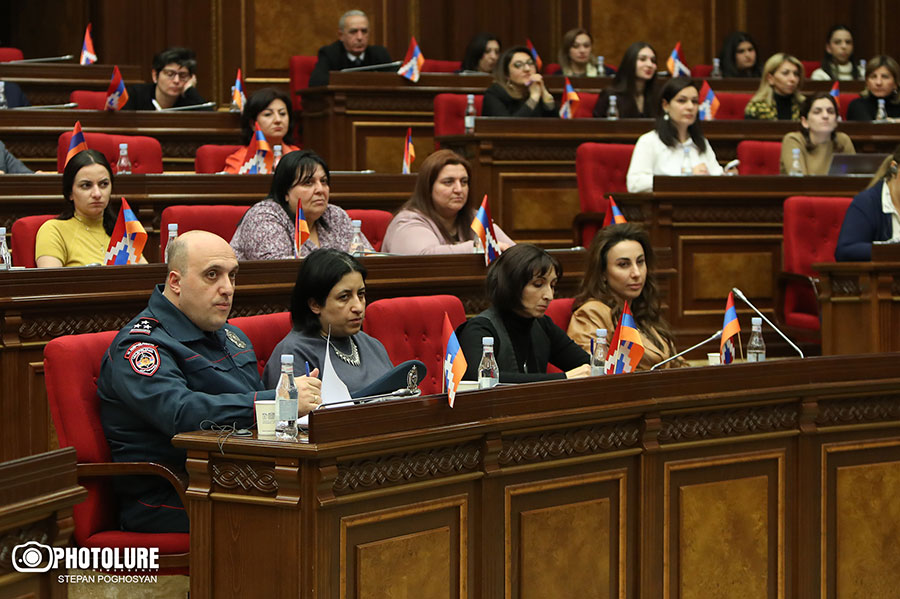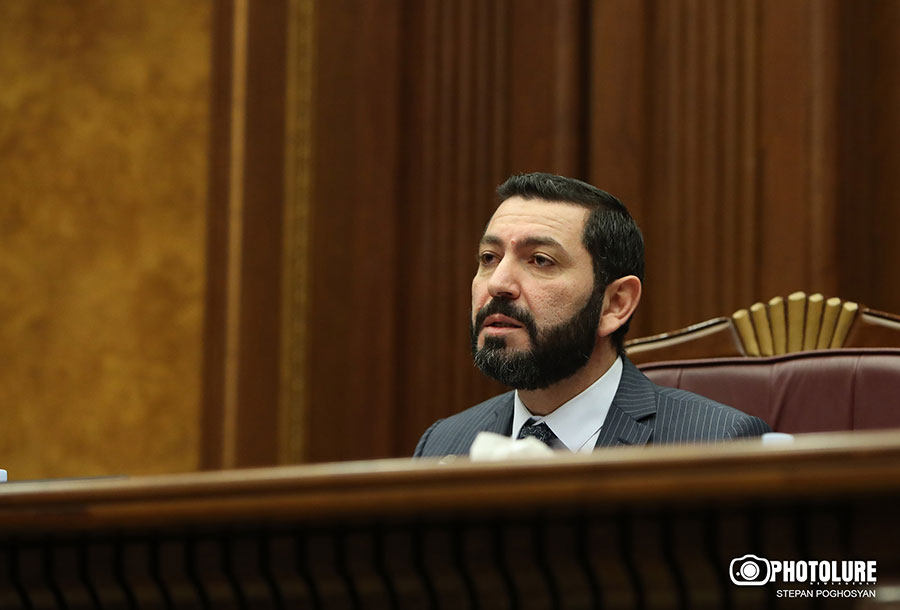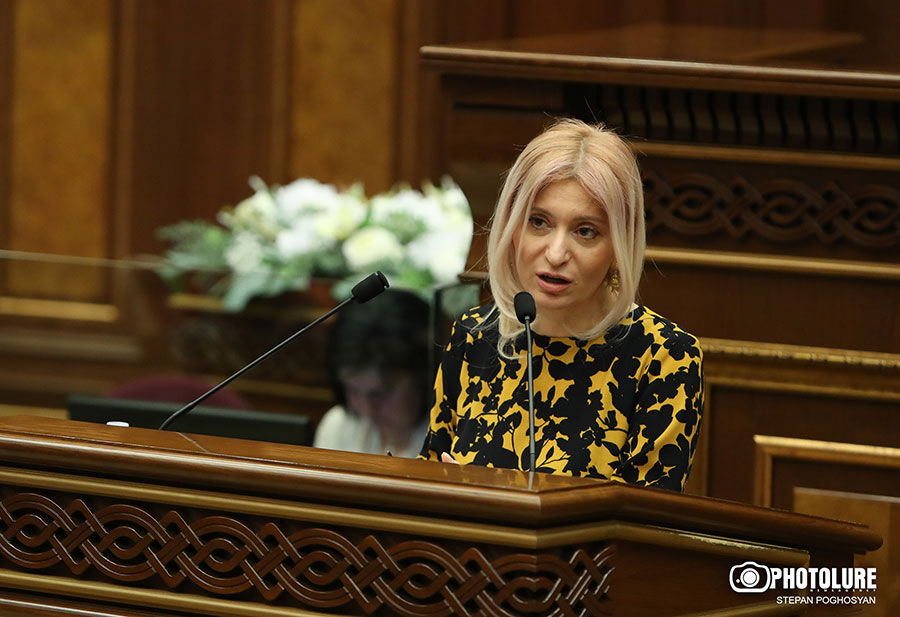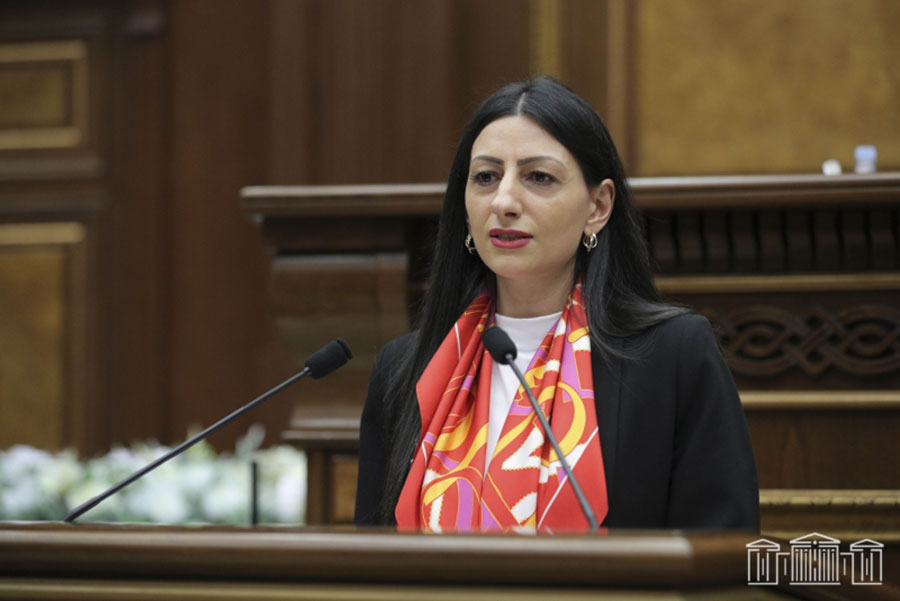The NA Standing Committee on Protection of Human Rights and Public Affairs convened parliamentary hearings on February 15. On the agenda was the topic Legislative reforms to raise the age limit for marriage in the context of the protection of fundamental human rights. The deputies, the members of the Government, the representatives of the competent departments, educational institutions, national minorities and non-governmental organizations participated in the hearings.
According to the current RA legislation, the age of marriage is 18. A person can get married at the age of 17 as well, if there is the consent of their parents, adoptive parents or trustees. A person can also get married at the age of 16, if there is the consent of their parents, adoptive parents or trustees, and the other person getting married is at least 18 years old.
The Deputy Chair of the NA Standing Committee on Protection of Human Rights and Public Affairs Rustam Bakoyan stated that he was planning to start the process of legislative amendments in order to raise the age limit for marriage. The Deputy Chair of the Committee recorded that as a representative of the Yazidi community, he receives alerts about marriage at an early age especially among Yazidis, but there are many cases among Armenians as well.
Read also
According to Rustam Bakoyan, the freedom to marry should not hinder the realization of a person’s compulsory education, health and a number of other rights. The deputy spoke about the negative health, educational and social consequences of the minors’ marriages. According to the Deputy Chair of the Committee, a mother who has not received a full education cannot ensure the full comprehensive education and development of her child.
Rustam Bakoyan referred to the 2005 resolution of the Parliamentary Assembly of the Council of Europe on Forced Marriages and Child Marriages, which specifically states: “The fact that there are authorities that under the veil of respect for the culture and traditions of the migrant communities show tolerance towards forced marriages and child marriages, despite the fact that the latter violate the fundamental rights of each victim.” The Assembly underlines the importance of the resolution of the UN General Assembly, according to which some customs, the outdated laws and practices regarding marriage and family are incompatible with the principles laid down in the UN Charter and the Universal Declaration of Human Rights.
“I attach importance to the raising of the age limit for marriage from the viewpoint of overcoming the challenges faced by our Yazidi community,” the deputy stated.
According to the RA Deputy Minister of Education, Science, Culture and Sport Araksia Svajyan, early marriages primarily affect the child’s exclusion from compulsory education. “We, as the Institution of Education, are concerned about this issue. The initiative is important so that we can solve or prevent all the problems that arise as a result of early marriage,” she noted.
The Deputy Minister informed that as of the academic year of 2023-2024, 1319 Yazidi girls have been studying in public schools. During 2023, 171 students left the education system. It was mentioned that the tendency of the Yazidi children to be excluded from education is significant, especially in high schools.
Speaking about the situation in universities, the rapporteur stated that the analysis of the last three years shows that none of the Yazidi girl students studied for the Master’s Degree. Araksia Svajyan addressed the issue of gender imbalance in the higher education system, stressing that very often girls do not have the opportunity to receive higher education.
According to the Deputy Minister, the new criterion of general education is already being implemented in schools. It has been tested for three years in Tavush province, this year it has already been introduced in the 2nd, 5th and 7th grades of all the schools of the republic. Within the framework of the introduction of the criterion, there is a mandatory grouping called Healthy Lifestyle, where children also study topics related to sexual education within the framework of a healthy lifestyle. “I think that a healthy lifestyle will also have a significant impact on the prevention of early marriages,” she said.
The Deputy Minister also spoke about the children who were left out of compulsory education. According to the representative of the Ministry, if there are no valid reasons for the absence of 6 working days, then additional work should be done to return the children to school. “I am sure that the regulated implementation of these works will also give an opportunity to prevent early marriages,” the Deputy Minster mentioned.
The Deputy Minister of Health Armen Gasparyan spoke about the negative consequences of early marriages from the viewpoint of health.
The RA Human Rights Defender Anahit Manasyan touched upon the full realization of the rights of national minorities and women, the role of the state in this matter and the steps taken to solve the problems. According to the rapporteur, in addition to the legislative regulations, multifaceted steps should be taken to change people’s worldview and approaches, the educational system should be completely reformed, because stereotypical approaches are first of all spread through these social institutions. In order to overcome the problems, the Defender highlighted proper work with parents, effective public awareness, talking about the legislative regulation. Anahit Manasyan underscored that the problem should be solved with a delicate and sensitive methodology: For this, the work carried out in close cooperation between the state, civil society and the relevant communities, including national minority communities, is necessary.
“Early marriage is considered an example of gender discrimination, because it is more harmful for girls and is more common among girls,” the Deputy Minister of Labor and Social Affairs Tatevik Stepanyan pointed out.
The questions of the MPs and the participants of the discussion related to the study of international experience in the field, the mechanisms preventing exclusion from compulsory education, the role of the school in the detection and prevention of domestic violence and interdepartmental cooperation in this matter, manifestations of bullying in educational institutions. During the speeches and the Q&A sessions, the importance of admitting the child to school within the specified period, the responsibility of parents in this matter, the negative influence of stereotypical thinking in a number of issues, the effective organization of parenting, the supervision of the teaching of the mandatory grouping Healthy Lifestyle in schools, the training of specialists teaching that subject, the factors leading to early marriages and the methods of combating them, the importance of informing the public were discussed. A proposal was made to make secondary education compulsory in case of marriage. According to Rustam Bakoyan, the state should work in cooperation with the communities to solve the problems in stages. Anahit Manasyan informed that in the near future she will visit the schools of the Yazidi community with Rustam Bakoyan to carry out public awareness activities with an effective methodology.
Rustam Bakoyan, considering the hearings effective, thanked the attendees for their active participation. The deputy noted that to achieve the desired result, not only legislative amendments are necessary, but also the use of a number of toolkits, implementation of awareness activities. The Deputy Chair of the Committee reminded that the Standing Committee on Protection of Human Rights and Public Affairs is open to constructive proposals and is ready to localize them in the legislative document in the future.
National Assembly of the Republic of Armenia





























































